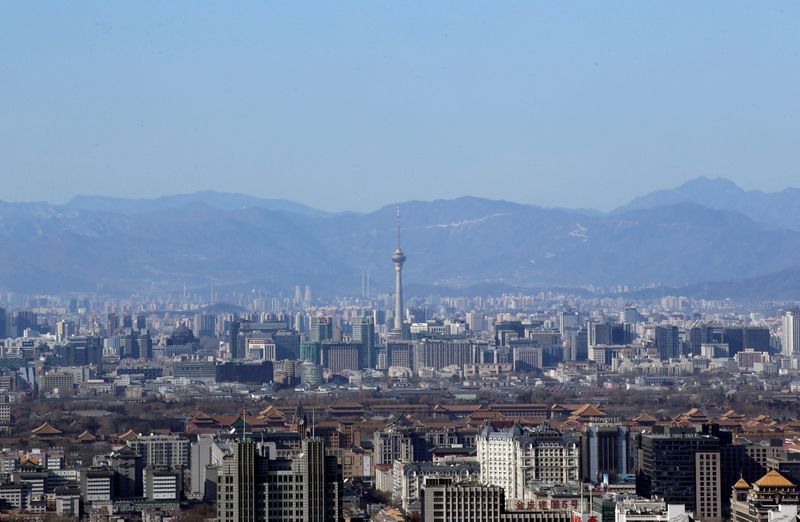By Sophie Yu and Casey Hall
BEIJING (Reuters) – Guilherme Carvalho made his first visit to China this month, with the Italian saying one of the main factors behind the trip was the post-pandemic policy of scrapping entry permits for some tourists.
Previously, all foreign visitors had to go through the arduous process of applying for a Chinese visa. Now, visitors from more than a dozen countries can simply fly in and stay for up to 15 days.
“I didn’t expect to feel so safe,” said Carvalho, who visited Shanghai. “Everyone is so nice.”
Carvalho is not alone. As authorities focus on boosting foreign tourism in an effort to revive the economy and boost sluggish consumer spending, thousands of visitors have flocked to China, encouraged by visa policies and easier access to unique digital payment services.
Data from China's largest online travel agency Trip.com showed that bookings from several countries subject to the visa policy, including France, Germany, Italy, Malaysia and Thailand, rose 150% year-on-year through June 24.
Bookings are also expected to be higher for July and August.
“We are very excited about the trend. Many people had some misunderstandings about China before they came, but after they came, they found cities like Shanghai very safe and very clean,” said Jane Sun, CEO of Trip.com.
Since December, China has offered visa-free access to tourists from several countries, including France, Germany, Italy, Spain, Australia, New Zealand and Poland.
Countries in Southeast Asia, including Thailand, Singapore and Malaysia, have also signed agreements with Beijing to enable visa-free travel.
In the week that China announced visa-free travel for visitors from Australia and New Zealand, travel sales increased 133% compared to the previous week, said Yvette Thompson, general manager of sales and marketing for Australia and New Zealand at travel agency Intrepid Travel.
“Post-COVID, visas are just another level of complexity for travelers. So to take away that complexity, I think it's a good move,” she said.
LONG DISTANCE RECOVERY
The recent surge in tourism comes after China closed its borders in early 2020 to combat the COVID-19 pandemic, which remained closed until early 2023.
But even with the visa-free policy, far fewer tourists are coming to China now than before the pandemic.
According to official tourism data, China received a total of 49.1 million foreign visitors in 2019, with more than a third coming for sightseeing and leisure. International tourism revenue reached $131.3 billion that year.
In the first half of 2024, the number of foreigners entering China was much lower, at 14.6 million. Of those, 8.5 million entered visa-free, slightly more than half of the total, according to the National Immigration Administration.
Since 2019, no data has been published on international tourism revenues from China.
Travel agents say they hope to see more foreign tourists next year as global travel demand and flight schedules continue to recover to pre-pandemic levels.
However, experts say China needs to do more than just abolish visas to attract foreigners.
Geopolitical tensions, a government that tolerates no dissent and the sometimes aggressive portrayal of China in some Western media have kept some tourists away. Two separate knife attacks on foreigners last month also raised security concerns.
China also has to compete for the attention of Japan, which is enjoying a tourism boom thanks to the weak yen.
“The more we talk about the reasons to go to China – the diversity of landscapes, the history, the difference between imperial Beijing and futuristic Shanghai – the quicker the negative publicity will disappear, I think,” says travel agent Thomson.
Another potential obstacle for foreigners is China's massive digital infrastructure.
Payment for everything from transport tickets to restaurant reservations and entrance tickets to tourist attractions is done via QR codes linked to local payment apps such as WeChat and Alipay, making everyday interactions difficult for holders of foreign bank cards.
China has allowed foreign bank cards to be linked to Alipay and WeChat, but the system and language barriers remain tricky.
“I can't imagine how a foreigner who doesn't have Chinese currency and doesn't speak the language can cope with this,” said Liang Hongling, a Chinese academic based in Glasgow who plans to travel to her hometown in Xinjiang this month with her Irish husband.
(Reporting by Sophie Yu in Beijing and Casey Hall in Shanghai; Editing by Anne Marie Roantree and Miral Fahmy)

